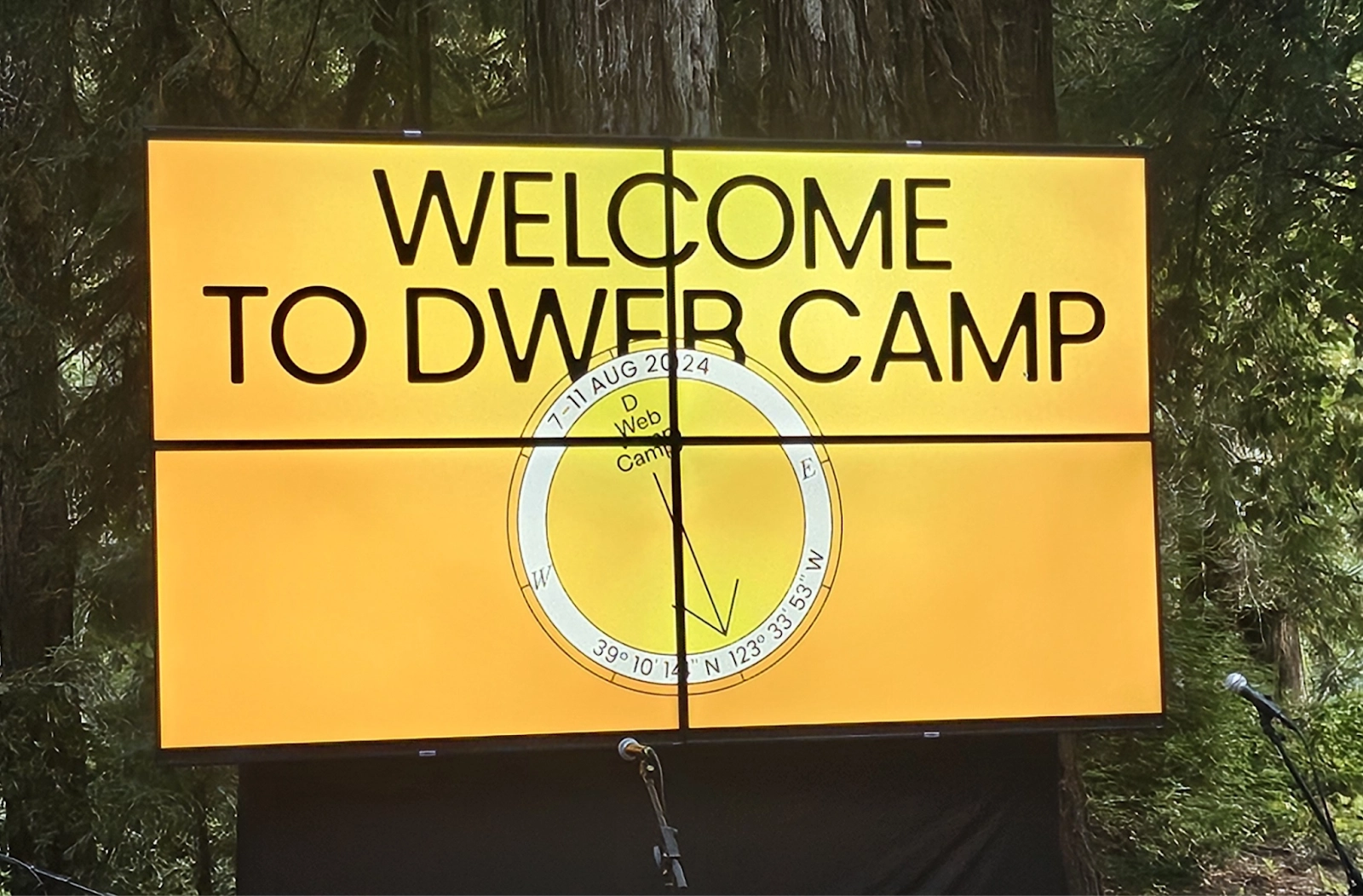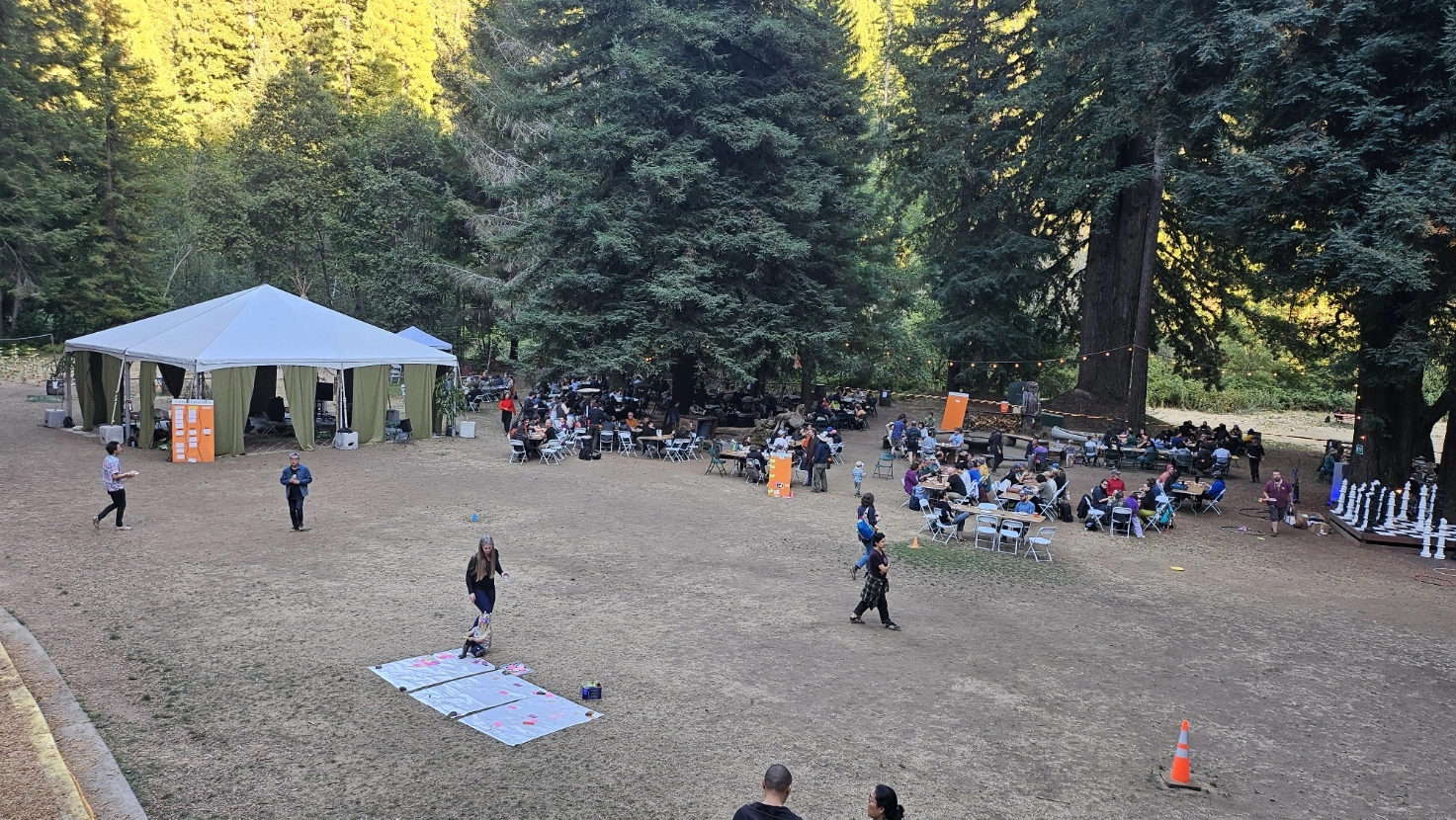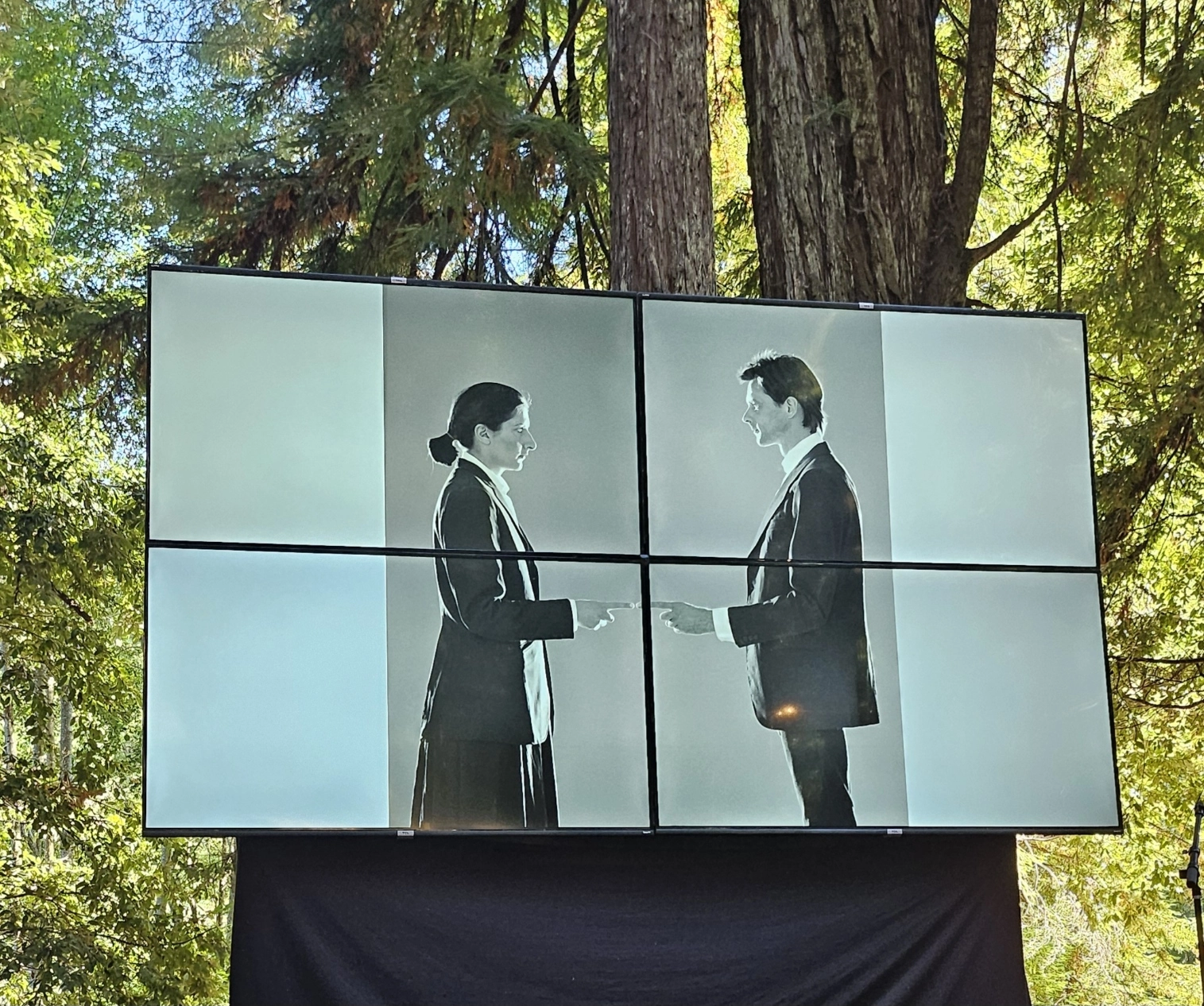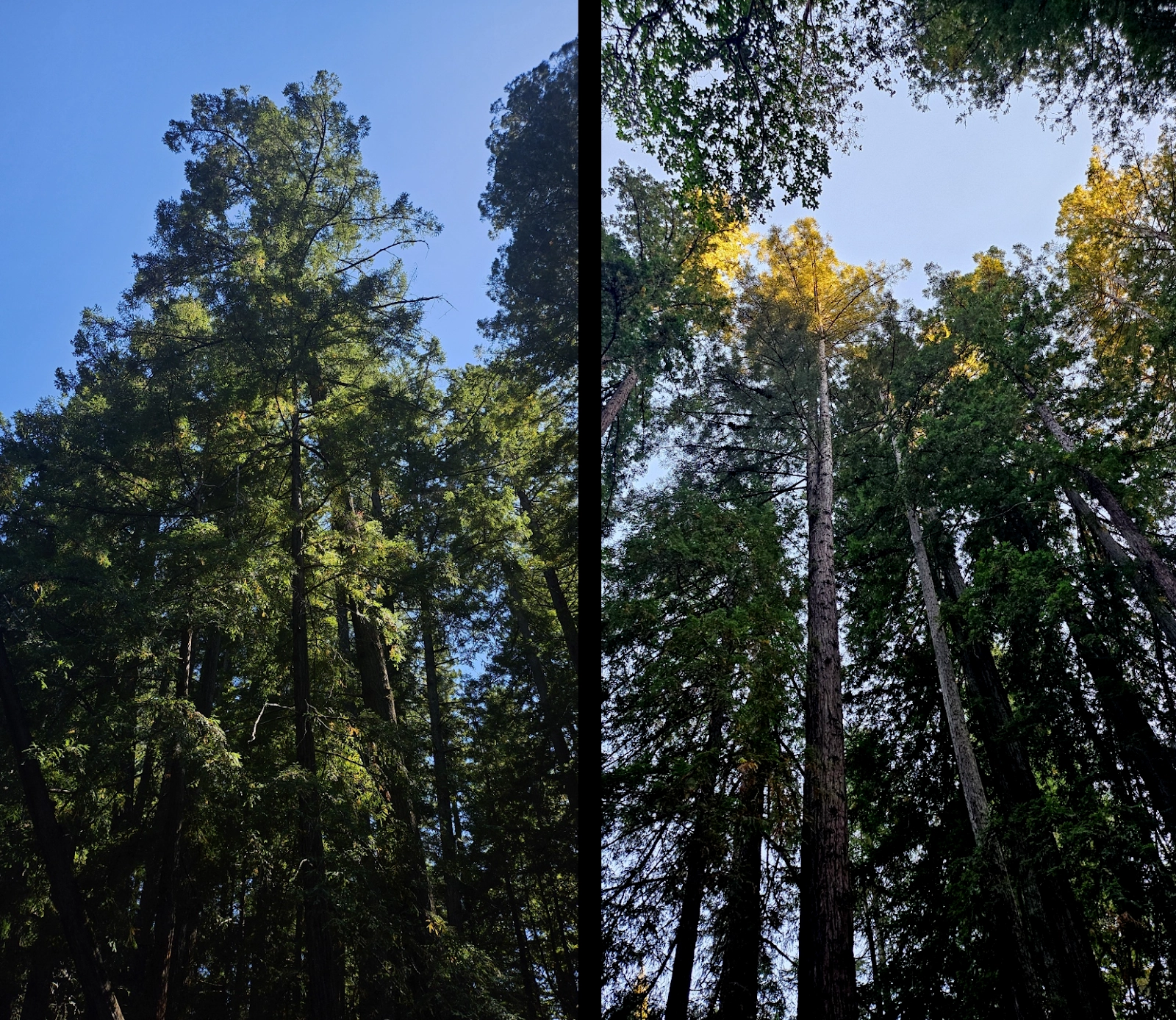“I like to think of a cybernetic ecology where we are free of our labors and joined back to nature, returned to our mammal brothers and sisters, and all watched over by machines of loving grace.”
– All Watched Over By Machines Of Loving Grace, Richard Brautigan
“The system of nature, of which [hu]man is a part, tends to be self-balancing, self-adjusting, self-cleansing. Not so with technology.”
– Technology With A Human Face, E. F Schumacher

Reflecting on DWeb Camp 2024
Between utopia and realism, these contrasting quotes set the tone for this recap of DWeb Camp 2024, a tech gathering in the Californian redwoods. DWeb Camp is a space for people to connect, share, and envision the future of the internet, and to explore how the decentralized web can foster healthier relationships with technology. Throughout our week-long gathering, we discussed decentralized governance, transparency, cooperation, ethical AI, and ecological metaphors that could inspire new ways of structuring interactions, embodying trust, human agency, and sustainability.
Migration: Moving Together
The theme of this year’s camp was Migration—Moving Together. Migration is all about movement—of people, animals, and data—driven by the desire to reach a better place. We explored how to migrate people and data to the decentralized web, supporting each other’s journeys. Discussions focused on tools that nourish communities rather than exploit them. Migration requires collective decision-making and policy, moving us toward models of organizing that respect everyone and foster solidarity. This naturally led to the exploration of governance models that emphasize resilience, stewardship, and shared expertise.

Exploring Decentralized Governance Models
A key session was the 0xSalon discussion titled “The Price of Anarchy,” which compared efficiency in systems with and without hierarchical coordination. We discussed decentralization, from solidarity-based organizations to packet routing, concluding that the efficiency of self-governing structures depends on scale. Other sessions offered insights into community-owned and operated network solutions, systems for providing monetary sovereignty to marginalized communities, strategies for connecting the unconnected, preserving cultural heritage, and fostering independence from telecom operators. These discussions emphasized grassroots governance models and shared community infrastructure, inviting creativity by enabling us to invent novel spaces and exchanges.

Creators and the Culture of Decentralization
Artists play a crucial role in advancing decentralization. At DWeb Camp, artistic organizations showcased how decentralized systems can reshape creative practices. “DWeb for Creators,” which was both a DWeb Camp session and an online course for creators organized by Gray Area, empowered artists to explore decentralized technologies for curation, publishing, and community building. Another session discussed the model of Partial Common Ownership (PCO), which reimagines art ownership by embedding community commitments and recognizing multiple stakeholders. PCO cultivates collective stewardship, challenging the traditional art market.
Despite these efforts, many artists still find themselves battling algorithms and relying on social media giants to share their work, underscoring the urgent need for new models. Social media today is dominated by a few large platforms, but decentralized alternatives are emerging. Protocols like ActivityPub offer a path to escape the dominance of centralized networks. At DWeb Camp 2024, Hypha and Sutty showcased how creators can use decentralized technologies to take control of their content distribution and communication channels. The session “How to Federate a Website” demonstrated how Distributed Press’ Social Inbox, integrated with Sutty CMS, allows creators to publish and communicate through the Fediverse. This federated solution empowers individuals by giving them control over their content and their relationship to their audience, fostering creative independence and collective growth.
AI, Norms, and the Ethics of Subversion: Learning from Nature
Set Amidst the redwoods at DWeb Camp, participants engaged with themes that linked nature, governance and artificial intelligence in unexpected ways. Sessions explored how AI could shape community values, either reinforcing or subverting norms to create an “emergent code of conduct.” A session titled ‘Making Machines Rage, Love, and Cry with Cryptography,’ explored how zero-knowledge proofs could enable AIs to make credible commitments, similar to human emotions in social interactions, serving as social commitment mechanisms. Another session, titled ‘AI to Decode Animal Communication: Reimagining our Relationship with the Rest of Nature,’ explored how AI might interpret animal communication, revealing its potential to bridge the gap between species and help us see ourselves as part of nature, fostering empathy and cooperative relationships across contexts.
These explorations were enriched by our experiences in nature, using ecological metaphors and systems thinking to frame discussions. As we hiked, stargazed, and immersed ourselves in acoustic ecology, ideas like “cybernetic forests” and “decision trees” became models for understanding both technology and governance holistically. Nature’s interdependencies served as a guide for promoting resilience, reminding us of the potential for AI to be part of a broader, cooperative system—a way to bridge technology with nature rather than separate them.

Building a Transparent and Resilient Future
As DWeb Camp concluded, participants felt both inspired by the prospects of decentralization and confronted by the entrenched power of centralized tech giants, particularly with regards to AI. The frictions of onboarding onto the decentralized web, the complexities of scaling distributed systems, and the ongoing need for fairer, inclusive and cooperative technology highlighted the challenges that must be addressed for a truly equitable digital future. Brautigan’s vision of a “cybernetic ecology” is beautiful, but Schumacher’s caution reminds us that technology is not inherently balanced or self-adjusting. While Brautigan’s idealism may seem unrealistic in the face of tech monopolies, climate collapse, and eroding democracies, striving for a future where technology integrates sustainably and equitably into our lives is a goal worth pursuing. Building communities rooted in transparency, resilience, and ecological awareness is challenging, but the journey is one we can take together.
